The Lie That Is Lincoln
Calling Carl Sandburg and other Lincoln scholars “ass-lickers,” “imbeciles,” and “sycophants,” and denigrating all previous biographies, histories, and works on America’s sixteenth president as “bullshit” is not the best way for a writer to get an audience to read his work, let alone take him seriously.
It is unfortunate that Stephen Miklosik writes The Lie That Is Lincoln in a style that is more angry rant than measured argument, for he makes some very thoughtful and rarely heard points about a man who has been as deified as any in American history. To get to those points, however, readers have to wade through crassly written, repetitive, and inflammatory verbiage, all of which not only weakens but also often obscures what intelligent ideas Miklosik is trying to convey.
Taking his cue from famed Civil War-era newspaper editor Horace Greely, who suggested that perhaps the North should “let the erring sisters go in peace,” Miklosik makes a case that Lincoln could have “recognized the South’s right to their own liberty.” Much like President Vaclav Havel of Miklosik’s native and now divided Czechoslovakia, Lincoln, the author argues, could have presided over an amicable and peaceful divorce and thus prevented the massive and “shocking waste of blood and treasure” that was the War Between the States.
While many may take issue with Miklosik’s thesis that the “sacrifice of so many lives for such a minor cause as slavery” was not only wasteful but also unnecessary, he does make the point that “others solved the issue of slavery in a sane bloodless way. Why couldn’t we?” That “nowhere but in America was the abolition of slavery associated with so much killing,” says Miklosik, is the fault of one man and one man alone: Abraham Lincoln.
Miklosik is a self-described “contrarian,” but he is not the only writer to attempt to poke holes in what is often called the cult of Lincoln. Many Southern historians writing in the decades after Reconstruction up through the 1930s put forth arguments similar to Miklosik. More recently, Libertarian and Tea Party writers, among them Thomas DiLorenzo in his 2006 work Lincoln Unmasked, have resurrected the arguments that Confederates, Copperheads, and other Lincoln contemporaries and detractors hurled at him on convention floors and in newspaper columns. They, like Miklosik, cast Lincoln as a dictator—an American Bismarck, the cold-hearted Prussian chancellor who through “blood and steel” united the German states into an empire. To them, Lincoln is the personification of all that is wrong with a strong federal system of government.
History has at least two sides, and Miklosik is trying to present the one that is less popular and less accepted. To do so effectively, however, he needs help. With a good editor to remove the foul language, tone down the invective, and better organize, tighten, and focus the writing, Miklosik could salvage his text and turn it into a work of serious historical commentary. Miklosik obviously compiled a good deal of research, and adding footnotes and citations for the many quotes used in the book would add weight and authenticity to his argument.
Reviewed by
Mark McLaughlin
Disclosure: This article is not an endorsement, but a review. The publisher of this book provided free copies of the book and paid a small fee to have their book reviewed by a professional reviewer. Foreword Reviews and Clarion Reviews make no guarantee that the publisher will receive a positive review. Foreword Magazine, Inc. is disclosing this in accordance with the Federal Trade Commission’s 16 CFR, Part 255.

